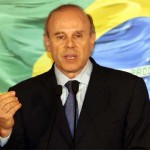Tax on Financial Operations (IOF)
The tax on Financial Operations – IOF – will be applicable on some incoming foreign investment which will imply on equity funds, debentures and market-market funds. As defined by the IOF Regulation107, such tax is assessed on different types of events:
- foreign exchange
- credit
- securities
- insurance
[important]

Brazil's Finance Minister Guido Mantega announced in December 2011 a package of measures aimed at stimulating the economy
To stimulate the Brazilian economy, the Brazil Finance Minister Guido Mantega announced on December 2nd 2011 a reduction of the IOF tax for foreign investors.
The tax changes include:
- The IOF on foreigners investing in Brazilian equities was reduced from 2% to 0%
- The IOF on foreigners investing in infrastructure-related bonds with duration of greater than 4 years was reduced from 6% to 0%
[/important]
Generally, the IOF-Exchange is assessed on the foreign currency exchange transactions for inflow and outflow of funds into and from Brazil, at the rate of 0.38%. Such rate, however, may vary depending on the nature of the foreign exchange transaction. There are cases of higher IOF exchange tax rates and, conversely, some situations when a 0% IOF-Exchange tax may apply. The Brazilian party is the IOF taxpayer; however, the commercial bank in charge of the closing of the foreign currency exchange transaction is responsible for paying such tax.
Executive Branch has broad powers to change
The IOF-Exchange is a type of tax over which the Executive Branch has broad powers to change the triggering events and the applicable rates. For foreign investors it is very important to review the IOF legislation at the time of the actual inflow and outflow of funds, as applicable, to confirm the current rules in force.
Recent changes
On October 19, 2009, the Brazilian Government announced the increase of the IOF (Financial Operations Tax) on foreign capital inflows into the Brazilian financial and capital market. Under this new rule, transactions that previously qualified for a 0% tax rate will now be taxed at 2%, regardless of whether they are related to short or long term investments.
The remittances related to dividends and interest on equity received by such foreign investors will still qualify for the 0% rate, as well as any transaction derived from the sale of the investment.
Direct investment rules were not amended and are still subject to a 0.38% IOF tax, both on the inflow and outflow of funds. The Finance Minister declared that such measures are created for the purpose of reducing the inflow of financial resources into the Brazilian capital markets, so as to try to stop the appreciation of the Brazilian currency. The new IOF measures were introduced by Decree 6,983/09, published on October 20, 2009 and are in force as of the same date.
On 5th October 2010 the government announced that it would increase the tax from 2% to 4% on certain investments. This raise is a part of the efforts that will slow down the heavy flow of incoming foreign investment and the current strong kudos of Brazil’s currency. Finance Minister Guido Mantega in announcing the measure said it would apply “only to fixed-income investments and funds, known as financial investments,” but not to “stock exchange investments or foreign direct investment.”
Ministry officials also elucidated that this rise in taxes will apply to debentures, multi-market funds and equity funds. This rise is not applicable to individual stock purchase, initial public share offerings, or transactions on the country’s BM&F Mercantile and Futures exchange. 2% IOF tax on incoming investment was initially implemented by the government in Oct. 2009. This implementation was a part of its foreign-exchange policy.


